When the French conquered
Algeria in 1830 they disrupted a thousand-year-old social system.
The North African Moslems had an insatiable need for slaves. Not
only did they raid European shores to abduct Whites but an immense system
for delivering Negro slaves had been in existence since the Moslem conquest.
This system had been run by the Tuaregs. This people was descended
from Whites dating back to at least the Phoenician conquest of North Africa.
Their alphabet probably precedes that of the Phoenicians. Undoubtedly
they were the descendants of the former inhabitants of Mediterranean Valley
known as Libyans in Egypt flushed out by the melting of the ice age.
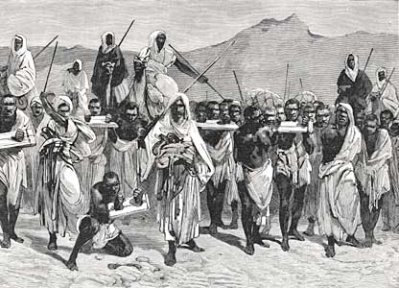 What they did before the arrival of the Moslems isn't known but with the
African conquest of the Moslems they became the middle men between Africans
of the Sahel and the Moslems of the North. Every year for a thousand
years the Tuaregs had collected convoys of Negroes from the South driving
them North across the Sahara. This was necessarily done with great
loss of life as the Tuaregs were not that tender toward the Negroes.
What they did before the arrival of the Moslems isn't known but with the
African conquest of the Moslems they became the middle men between Africans
of the Sahel and the Moslems of the North. Every year for a thousand
years the Tuaregs had collected convoys of Negroes from the South driving
them North across the Sahara. This was necessarily done with great
loss of life as the Tuaregs were not that tender toward the Negroes.
With the advent of the Atlantic
Slave Trade in the sixteenth century the Tuaregs also captured Negroes
and drove them to St. Louis in Senegal for sale and transshipment to the
Americas. According to James Welland the depredations on the Blacks
was so great that the area around Lake Tchad had been cleared of inhabitants.
This age old life style was disrupted in 1830 by the French. By that
time Europeans had discontinued the slave trade so that the French
disrupted the trans-Sahara trade causing a disruption in the Tuareg economy
from which there was no recovery. Welland explains:
In short, the official
abolition of the slave trade, the desert tribes, the desert itself for
that matter began to play a diminished part in human affairs, and the Tuareg,
who had been the only link for two and a half thousand years between Central
Africa and the Mediterranean -- in other words, between the Negro and the
White world -- began to pass from the stage of history. They were
left unemployed and purposeless, with the result that they turned to intertribal
war and oasis raiding to keep some semblance of their nationhood.
Then again, as the supply of black labor dried up, the palmeries were increasingly
neglected and often, as the consequence of a razzia, comepletely destroyed.
The size and number of oases decreased, sand filled the wells and cisterns
-- many of which had been maintained since Roman times -- and the age old
trails became more hazardous and finally were hardly used at all.
In the secret service in Africa
De Beaujolais becomes involved in the maelstrom of change, racial conflict
and bad memories which were now exacerbated by the arrival of the non-Moslem,
or Christian, French. The novel becomes then a sort of proto-thriller.
De Beaujolais is on a mission to a town called Zaguig when he is caught
up in a Moslem revolt. In Zaguig he meets the touring Mary and Otis
Vanbrugh. Otis, you will remember returns from Beau Geste.
Mary is the love interest in
the story and she will conflict De Beaujolais between his love for her
and his duty as imposed by his uncle. Frankie Laine or Tex Ritter
and songwriters Dimitri Tiomkin and Ned Washington (I tried to work Trad.
in there somewhere but couldn’t do it) expressed the balance well in the
song High Noon:
Oh to be torn ‘betwixt’ love and duty
Supposin’ I lose my fair haired beauty…
De Beaujolais relates the story
of another agent who chose his beauty over duty and was drummed out of
the service ultimately being killed. De Beaujolais has a premonition.
Wren cleverly resolves the choice so that De Beaujolais gets his beauty
while fulfilling his duty.
At the same time Otis Vanbrugh
meets the apparent Arab dancing girl, who yet retains European features,
who will figure largely in the sequel.
As the revolt erupts these conflicts
emerge. As is usual in thrillers things are not what they seem.
Raoul D'Auray De Redon, a close friend of De Beaujolais' remains behind
disguised as an Arab to confuse their attack on a small French garrison
destined to be wiped out. De Beaujolais has important dispatches
which must be delivered. Thus duty makes him appear to be an ingrate
and coward humiliating him before Mary. His job is to locate the
latest Arab Mahdi and suborn him the the French side.
De Beaujolais thinks little of
Otis Vanbrugh and we are meant to accept his opinion. His true story
will appear in the sequel.
Mary was one of those women who
flirt by taunting or ridiculing her guy. In her case when De Beaujolais
was within hearing she mockingly whistled a tune De Beaujolais couldn't
quite place but was called "Abdullah Bulbul Amir." This was a very
popular song and poem of the time that can be found at http://wiki.answers.com/Q/lyrics_of_bhulbhuliya.
A couple of verses of its 19 will suffice to give its tenor, but the poem
is one you should be familiar with.
The sons of the Prophet are hardy and bold,
And quite unaccustomed to fear,
But the most reckless of life or of limb
Was Abdullah Bulbul Amir.
When they wanted a man to encourage the van
Or harass a foe from the rear,
Storm fort or redoubt, they had only to shout
For Abdullah Bulbul Amir.
Apparently the poem was so well
known that Wren felt no need to name it and he doesn't.
The time to leave Zaguig
comes, so taking his entourage of faithful soldiers, Mary and her maid
Maud, he sets out into the desert toward Oran.
Soon Tuareg or Arab raiders pick
his party up and they are forced to fight a pitched battle although from
an advantageous position. Here De Beaujolais has to make a very difficult
choice between between loyalty to his men and his duty to get his dispatches
through. Getting his men into position he is compelled to abandon
them to their fate and push on.
This puts a strain on his relationship
with Mary who cannot understand the concept of duty or necessity -- the
necessity to get the dispatches through. After a long flight the
party falls into the hands of a desert tribe. But this is a strange
desert tribe. Rather than the usual unorganized tactics these fellows
seem to have the scientific training of the French. Another mystery.
As luck would have it De Beaujolais
and the women were captured by the Mahdi's troops. By way of explanation
the Moslem Mahdi is equivalent to the Jewish Messiah, but not the Christian
Messiah. There's only one Christ but Jewish Messiahs and Moslem Mahdis
pop up everywhere.
So now, going back to the ending
of Beau Geste, the two Americans Hank and Buddy were out there somewhere
trodding the burning sands. Hank was discovered and rescued on the
point of death by a kind-hearted Sheik, while Buddy was captured by hard-hearted
Tuaregs being saved from death when Hank Sheik's tribe defeated his captors.
Buddy was out there somewhere for a long time because Hank had been rescued
years before.
Having been rescued at the point
of death Hank was aware of the necessity to pass as a Moslem so he pretends
to be dumb until he has learned the language so well he can pass.
He then cleverly becomes the tribe's sheik. The tribe is then
threatened by a razzia of Tuaregs. As this takes place in the North,
Tuaregs no longer having Negroes to convoy have taken to raiding the oases.
Normally the tribe would have run and hid leaving their goods and a few
token members as slaves for the Tuaregs. Hank has a better idea
and using his superior scientific French training, the tribe, rather than
waiting to be attacked, unexpectedly attack the Tuareg camp handily defeating
them. Buddy is thus rescued. Coincidences are dime dozen out
on the burning sands.
Teaching Buddy the language while
he too plays dumb, Buddy becomes Hank's vizier. With Buddy as military
commander the tribe is trained in scientific methods in earnest.
They then begin to organize the tribes into a confederation thus earning
Hank the title of Mahdi in French eyes. De Beaujolais was thus on
a mission to co-opt the new Mahdi.
As luck, or coincidence, would
have, at the same time De Beaujolais and the girls arrive so does Becque/Rastignac.
Becque is now employed one supposes by the Soviet Union to arouse the Moslems
to a jihad. He comes bearing gifts not realizing that Hank and Buddy
are his old Legion comrades. He doesn’t recognize them but Hank recognizes
him. Becque and De Beaujolais have that old unsettled score to settle.
De Beaujolais now settles his hash removing that source of irritation.
I've pointed out before that
Burroughs very likely drew inspiration for his series of political Tarzan
novels from 1930 to 1933 after reading this trilogy from 1924 to 1928.
The Sahara had fascinated him long before he read Wren. David
Innes of Pelucidar even surfaces in the Sahara returning from the Inner
World. The great desert and the Sahel is not quite as we Westerners
have imagined it. The thousand-year-long history of amazing suffering
boggles the imagination. A thousand years of thousand mile treks
from South to North, untold millions of Africans were trekked across the
burning sands with equally untold millions falling along the way.
This is not all. This is a horror story. Welland again, p.
116:
Even after the slave trade
had been suppressed, the old life of the desert survived for a while for
one simple reason … the absence of salt in the Sudan. Nearly all
the salt in Central Africa had always come from the north across the Sahara
on the backs of camels, donkeys, horses and men. The salt mines in
the middle of the most terrible wastelands of the desert -- at Taghaza,
at Taodeni, and at Bilma -- had always been worked all the year round by
Negro slaves, who died within a few years of their arrival at the mines
and were immediately replaced by new workers. The salt they mined
was worth its weight in gold in Timbuktu, and its transport across the
desert was a considerable enterprise of unbelievable size, involving the
assembling of as many as 40,000 camels to make the quick dash from
Bilma to Kano.
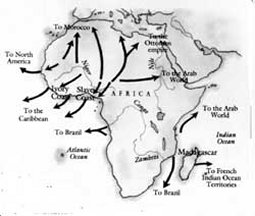
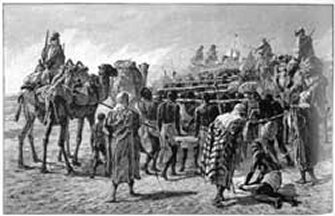
About 80% of those captured by Muslim slave raiders
died before reaching the slave markets.
The death toll from 14 centuries of the Islamic slave
trade in Africa is estimated at over 112 million.
Think of it. For a thousand years
Negroes were dropped down a funnel in a steady stream to live the most
miserable of lives for a very few years. Over a millennium!
Think of it. I should think those Negroes who travelled the Middle
Passage in the Atlantic Slave Trade ending up in the paradise of the Caribbean
and the Americas should bless their deliverers from that African hell.
Africans should bless the French
for delivering them from total servitude and degradation. When one
digs for facts beneath the surfice, the things one finds.
Thus without giving any historical
background Wren is telling the story of how Europe saved the Africans from
themselves. Indeed, Hank and Buddy singlehandely rearrange North
Africa on livable lines. The two, in the story, break the power of
the Tuaregs while establishing an African paradise in a hundred square
mile oasis. Their people are delivered into prospeirty by a million
franc subsidy from France that Hank and Buddy use for the betterment of
their people rather than sequestering it in a numbered Swiss bank account.
A new day for Africa indeed courtesy of Western enlightenment.
Thus De Beaujolais accomplishes
his mission to align the new Mahdi, Hank, with France while winning his
fair heared beauty and pleasing his uncle.
Hank marries Maud the maid leaving
Buddy hanging out but not for long. We still have the last of the
trilogy, Beau Ideal to go. Let’s
go.
Bibliographial Entry: Welland, James: "The
Merchandise Was Human," Horizon Magazine, Vol. VII, No. 1, Winter 1965.
PP. 111-117

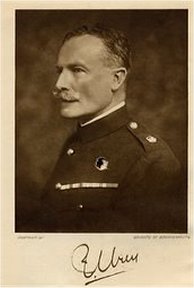
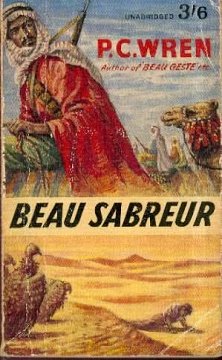
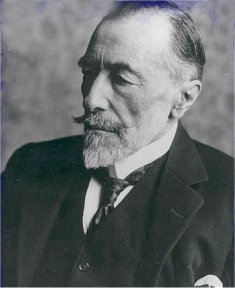
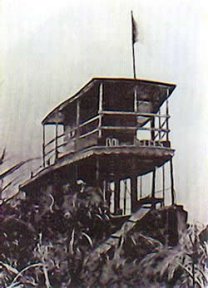
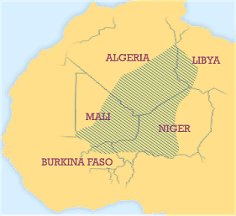
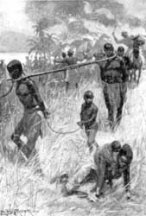
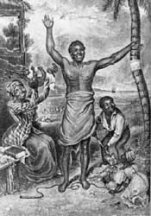
 What they did before the arrival of the Moslems isn't known but with the
African conquest of the Moslems they became the middle men between Africans
of the Sahel and the Moslems of the North. Every year for a thousand
years the Tuaregs had collected convoys of Negroes from the South driving
them North across the Sahara. This was necessarily done with great
loss of life as the Tuaregs were not that tender toward the Negroes.
What they did before the arrival of the Moslems isn't known but with the
African conquest of the Moslems they became the middle men between Africans
of the Sahel and the Moslems of the North. Every year for a thousand
years the Tuaregs had collected convoys of Negroes from the South driving
them North across the Sahara. This was necessarily done with great
loss of life as the Tuaregs were not that tender toward the Negroes.
















